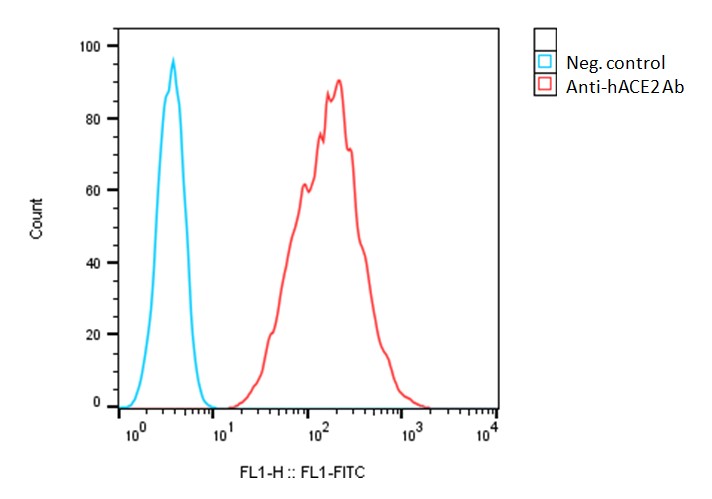
| Catalog Number | Product | Size | Price | |
|---|---|---|---|---|
| C3085 | Human ACE2-CHO-K1 stable cell line | 2 vials | $4950 | Order |
| Catalog Number | C3085 |
|---|---|
| Cell Line Name | Human ACE2-CHO-K1 stable cell line |
| Accession Number | NM_001371415.1 |
| Host Cell | Adherent CHO-K1 |
| Quantity | Two vials of frozen cells (2x106 per vial) |
| Culture Medium | DMEM with 10% FBS, 4 ug/ml puromycin |
| Freezing Medium | 90% FBS and 10% DMSO |
| Storage | Liquid nitrogen upon receipt |
| Product Datasheet: | Download PDF |
Detection of human ACE2 expression on human ACE2-CHO-K1 stable cells using a monoclonal antibody specific for human ACE2 (SinoBiological, Cat #10108-MM36-F)

Angiotensin-converting enzyme 2 (ACE2) is a protein encoded by the ACE2 gene in humans. It is a type I membrane-bound glycoprotein that plays a crucial role in the renin-angiotensin system (RAS), a hormone system that regulates blood pressure, fluid, and electrolyte balance. ACE2 converts angiotensin II into angiotensin 1-7, a peptide that counteracts the effects of angiotensin II by promoting vasodilation, reducing blood pressure, and providing anti-inflammatory and antifibrotic effects. Additionally, ACE2 serves as a receptor for the spike protein of coronaviruses, including SARS-CoV and SARS-CoV-2, facilitating viral entry into host cells. High levels of ACE2 expression are found in the lungs, heart, kidneys, intestines, and testes and in the endothelial cells of blood vessels and in the epithelial cells of the respiratory and gastrointestinal tracts. This broad tissue distribution is critical for its role in cardiovascular and respiratory physiology, as well as in the body's response to viral infections. The expression of ACE2 in cancers is variable and can differ depending on the type of cancer and tissue involved. Some studies have reported altered ACE2 expression in certain cancers, including lung, kidney, and liver cancers. In some cases, ACE2 expression is downregulated, which may be associated with tumor progression and poorer prognosis. Conversely, in other cancers, increased ACE2 expression has been observed, potentially reflecting the tissue's response to hypoxia or inflammation. The role of ACE2 in cancer biology is complex and still under investigation, with some evidence suggesting that its expression may influence tumor microenvironment, angiogenesis, and metastasis.
Hoffmann M, Kleine-Weber H, Schroeder S, et al. SARS-CoV-2 Cell Entry Depends on ACE2 and TMPRSS2 and Is Blocked by a Clinically Proven Protease Inhibitor. Cell. 181(2):271-280. 2020.
Patel VB, Zhong JC, Grant MB, Oudit GY. Role of the ACE2/Angiotensin 1-7 Axis of the Renin-Angiotensin System in Heart Failure. Circ Res. 118(8):1313-1326. 2016.